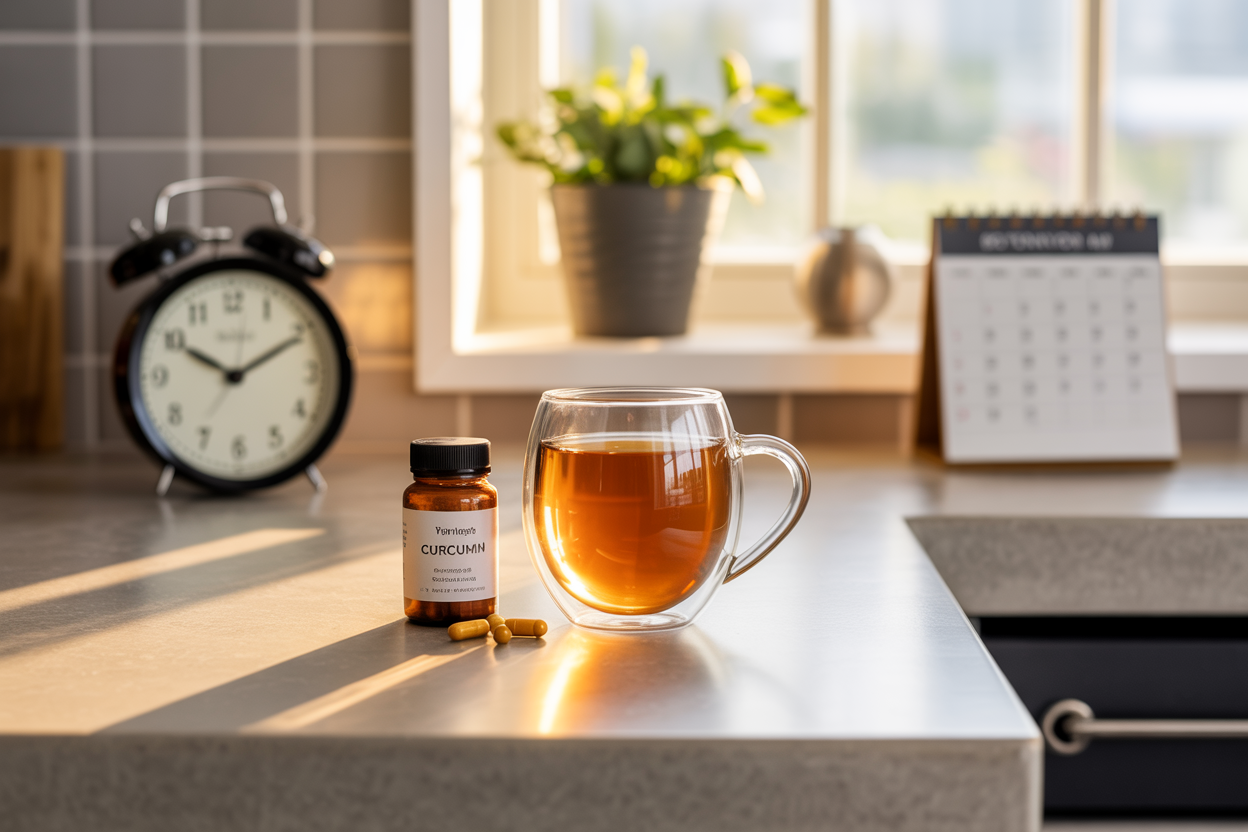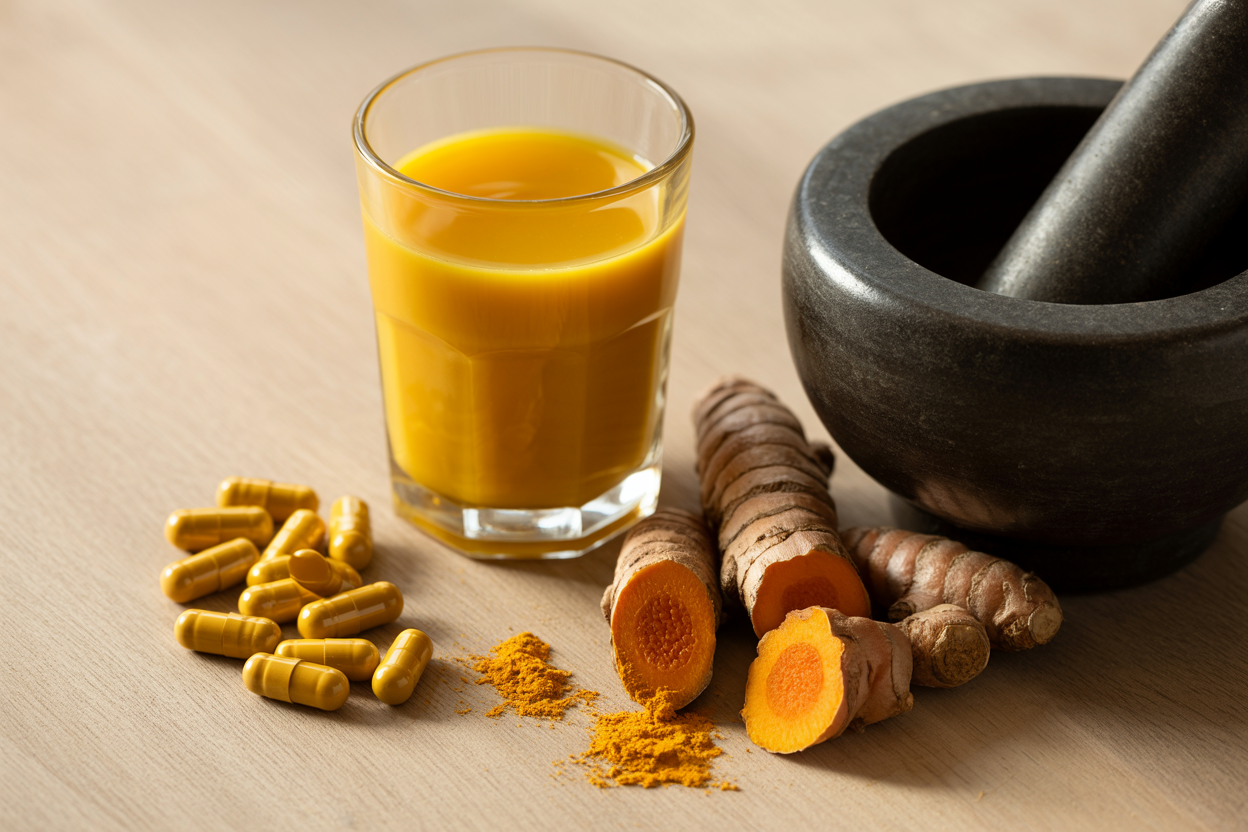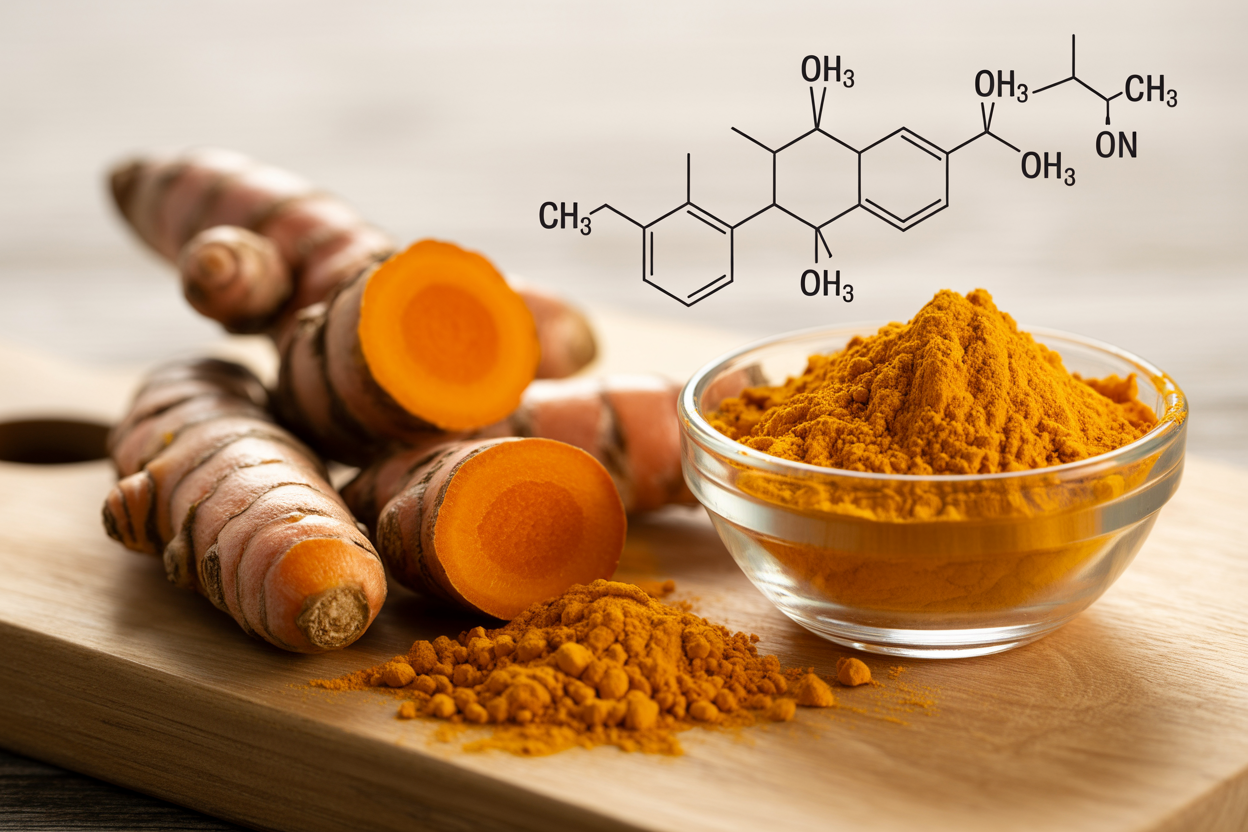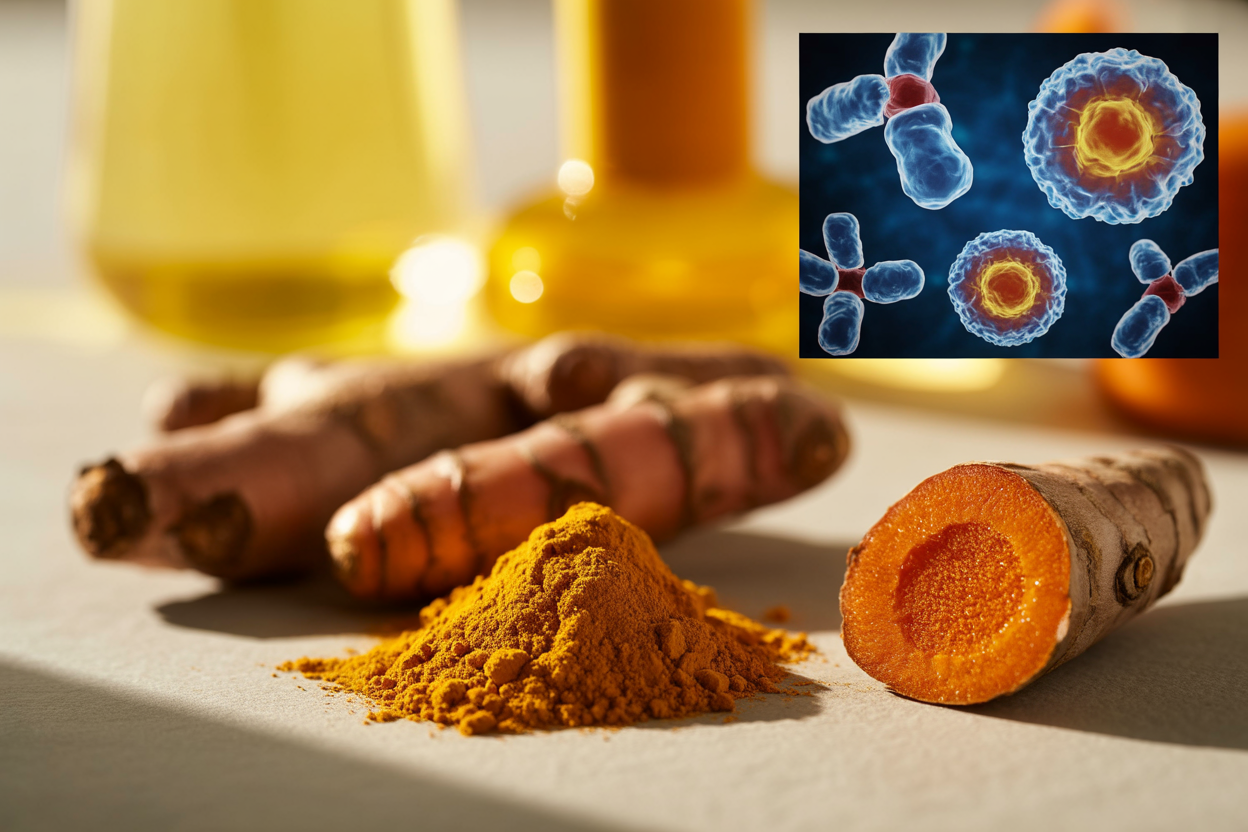There’s growing scientific evidence that turmeric curcumin enhances immune health, especially during cold and flu seasons. Ever noticed how some people seem to power through cold and flu season without so much as a sniffle? Their secret weapon might be sitting in your spice cabinet right now. That golden powder that stains everything it touches could be your immune system’s new best friend.
Turmeric curcumin enhances immune health by reducing inflammation, improving antioxidant activity, and supporting the body’s natural defense system.
What you’ll discover here isn’t just another health fad. It’s science-backed evidence about how this ancient root can transform your body’s defense system from the inside out.
But before you start dumping turmeric into everything you eat, there’s something crucial you need to know about absorption that most people get completely wrong.
What’s the best time to take turmeric curcumin?

The timing of your turmeric dose matters big time. Take it with meals containing fat to boost absorption by up to 2000%. Morning doses can help with all-day inflammation, while evening doses may improve sleep quality. Some folks split their dose twice daily for consistent benefits. Always pair with black pepper for maximum effect.
How to take turmeric for an infection?

For infections, mix a teaspoon of turmeric powder with warm milk and honey before bed. Or try golden paste – combine turmeric powder with black pepper and coconut oil for better absorption. Turmeric capsules (400-600mg three times daily) work too. Always start with smaller doses and increase gradually. For external infections, make a paste with turmeric and water to apply directly.
Understanding Turmeric and Curcumin

What is turmeric and its historical uses
Turmeric isn’t just that yellow powder sitting in your spice rack. This vibrant root has been coloring plates and healing bodies for over 4,000 years. Native to Southeast Asia, particularly India, turmeric has been the golden child of traditional medicine systems.
The ancient Indians weren’t just cooking with turmeric—they were worshipping it. In Ayurvedic practices, turmeric was the go-to for everything from clearing skin conditions to easing digestive troubles. They called it “the spice of life” for good reason.
Chinese medicine practitioners caught on too, using turmeric to move qi and alleviate pain. And in places like Okinawa, Japan, people have been drinking turmeric tea daily for centuries—might explain why they live so darn long.
Curcumin: the active compound explained
Think of turmeric as a superhero and curcumin as its power source. Making up only about 2-5% of turmeric, curcumin packs the punch behind most of turmeric’s health benefits.
Curcumin is what gives turmeric its vibrant yellow color. But more importantly, it’s responsible for turmeric’s antioxidant and anti-inflammatory superpowers.
The science gets interesting when you look at curcumin’s molecular structure. It can target multiple pathways in your body simultaneously, which is pretty rare for a natural compound. This multi-targeting ability is why researchers keep finding new benefits of curcumin.
Traditional medicinal applications across cultures
Walk through any traditional medicine market from Mumbai to Marrakech, and you’ll find turmeric featured prominently.
In India’s Ayurvedic tradition, turmeric has been prescribed for respiratory conditions, liver disorders, and joint inflammation for thousands of years. They even applied turmeric paste to wounds as a natural antiseptic.
Looking for a modern skincare option? This Turmeric Face Toner harnesses turmeric’s antibacterial and anti-inflammatory benefits to help tone, calm, and brighten your skin—rooted in traditional Ayurvedic wisdom.
Indonesian jamu medicine has its own turmeric drink called “jamu kunyit,” used to purify blood and promote postpartum recovery.
In Thai folk medicine, practitioners used turmeric for stomach ailments and to treat infections. Meanwhile, Middle Eastern cultures incorporated it into remedies for digestive issues and as a natural detoxifier.
Bioavailability challenges and solutions
Here’s the frustrating part about curcumin—your body doesn’t absorb it very well on its own. You could eat spoonfuls of turmeric powder and most of the good stuff would pass right through you.
The main culprits? Curcumin is fat-soluble (not water-soluble), gets metabolized quickly, and has poor absorption in the gut.
But don’t worry, traditional cultures figured this out centuries ago:
- In India, they mix turmeric with black pepper, which contains piperine that can increase curcumin absorption by up to 2,000%
- Golden milk combines turmeric with fat (traditionally ghee) to improve absorption
- Modern supplements use technologies like:
- Liposomal encapsulation
- Nanoparticle formulations
- Combining with essential oils
The simplest home solution? Always take your turmeric with a meal containing healthy fats and add a pinch of black pepper. Your immune system will thank you.
How Turmeric Curcumin Enhances Immune Health: The Science Explained

Anti-inflammatory mechanisms of curcumin
A key reason why turmeric curcumin enhances immune health is its anti-inflammatory ability. Ever wondered why turmeric is the rockstar of the spice world when it comes to fighting inflammation? It’s all about curcumin, the golden compound that gives turmeric its vibrant color.
Curcumin blocks inflammatory pathways in our bodies by inhibiting key molecules like NF-κB, which acts as a switch for triggering inflammation. Think of NF-κB as the fire alarm that curcumin keeps from going off unnecessarily.
What makes curcumin truly special is how it targets multiple inflammation pathways at once. It blocks pro-inflammatory enzymes (COX-2 and LOX) while also reducing the production of inflammatory messenger molecules called cytokines.
During immune responses, this matters big time. Chronic inflammation can exhaust your immune system, making it less effective at fighting actual threats. By keeping inflammation in check, curcumin helps your immune system stay balanced and ready for action. According to research published by NIH, turmeric’s curcumin content shows promise in modulating immune responses naturally.
Antioxidant effects and free radical neutralization
Your body is constantly under attack from free radicals – unstable molecules that damage cells and weaken immunity. Curcumin steps in like a superhero with a dual power move.
First, it directly neutralizes these free radicals by donating electrons to stabilize them. But that’s just the warm-up act.
The real magic happens when curcumin activates your body’s own antioxidant defenses. It boosts enzymes like glutathione peroxidase and catalase – your internal cleanup crew that sweeps away oxidative damage.
This antioxidant protection specifically helps immune cells stay healthy and functional. When your immune cells aren’t damaged by oxidative stress, they’re much better at identifying and attacking pathogens.
Regulation of immune cell function
Curcumin doesn’t just support your immune system – it helps direct traffic. It influences both innate immunity (your first-line defense) and adaptive immunity (your specialized response team).
For innate immunity, curcumin enhances the activity of macrophages – immune cells that engulf and destroy harmful invaders. It also boosts natural killer cells that take down virus-infected cells.
On the adaptive side, curcumin modulates T-cell and B-cell function, helping coordinate your body’s targeted immune responses. This is particularly important for preventing your immune system from overreacting or underperforming.
The beauty of curcumin is its balancing act – it can ramp up immune activity when needed but also calm things down during excessive responses.
Clinical research findings on immune response
The evidence backing curcumin’s immune benefits keeps growing stronger. Real-world studies show impressive results.
A 2016 review published in the Journal of Medicinal Food analyzed multiple clinical trials and found that curcumin supplementation consistently improved several markers of immune function in human subjects.
In a double-blind study of 60 healthy adults, those taking curcumin for 8 weeks showed significantly higher levels of immune-protective proteins and improved activity of natural killer cells compared to the placebo group.
Research from Oregon State University demonstrated that curcumin increased antibody responses by up to 25% in animal models, suggesting enhanced immune memory.
What’s particularly impressive is how curcumin seems most effective in people with compromised immunity. A 2018 study found that participants with seasonal allergies experienced reduced symptoms and improved immune markers after taking curcumin supplements for just 30 days.
These findings suggest curcumin doesn’t just temporarily boost immunity – it helps restore proper immune function at a fundamental level.
Specific Immune Benefits of Turmeric Curcumin

Fighting respiratory infections naturally
Ever caught a cold that just wouldn’t quit? Turmeric might be your new best friend. This golden spice packs a serious punch against respiratory infections.
When viruses or bacteria invade your airways, turmeric jumps into action. It helps thin mucus, making it easier to expel those nasty pathogens from your lungs. Plus, its antimicrobial properties directly attack the bugs causing your misery.
A spoonful of turmeric tea when you’re feeling that scratchy throat coming on? That’s not just an old wives’ tale. The curcumin in turmeric actually helps reduce inflammation in the airways, making breathing easier during infections.
Supporting gut health as an immune foundation
Your gut is basically immune system headquarters. About 70% of your immune cells live there! And turmeric? It’s like a security upgrade for the whole system.
Curcumin promotes a diverse microbiome by encouraging beneficial bacteria growth while keeping the troublemakers in check. A balanced gut equals a balanced immune response.
People with digestive issues often notice improved immunity when they add turmeric to their routine. For more tips, explore our full Natural Wellness guide featuring herbs, supplements, and holistic habits that support immune and gut health. That’s because it helps repair intestinal barrier function – essentially fixing the holes in your defense system.
Reducing chronic inflammation for long-term immunity
Chronic inflammation is like having your immune system stuck in overdrive all the time. It’s exhausting and counterproductive.
Turmeric steps in by blocking inflammatory pathways at the molecular level. It’s like a traffic cop redirecting your immune response to where it’s actually needed.
The beauty of curcumin is that it reduces inflammation without shutting down the entire immune system. Unlike some medications, it’s selective – targeting only the problematic inflammatory responses while keeping your protective functions intact. Another reason turmeric curcumin enhances immune health is by stimulating your body to produce more antibodies.
Enhancing antibody production
Antibodies are your body’s custom-made weapons against specific threats. Turmeric doesn’t just fight inflammation – it actually helps your body create more of these specialized defenders.
Research shows curcumin can increase antibody responses, essentially upgrading your immune arsenal. This means better protection next time you encounter the same pathogen.
What’s particularly interesting is how turmeric enhances B-cell function – the cells responsible for producing antibodies. It’s like giving your immune system’s weapons factory better equipment and more resources. For older adults, one of the ways turmeric curcumin enhances immune health is by preserving T-cell function.
Age-related immune decline prevention
Getting older shouldn’t mean getting sicker more often. Yet our immune systems naturally weaken with age – a process called immunosenescence.
Curcumin’s antioxidant properties directly combat this age-related decline. It fights oxidative stress that damages immune cells and helps maintain their function longer.
Many older adults who take turmeric regularly report fewer seasonal illnesses and faster recovery times. The compound helps preserve T-cell function – critical immune cells that tend to become less effective as we age.
Optimal Ways to Consume Turmeric for Immune Health

Dietary incorporation strategies
Getting more turmeric into your daily diet doesn’t have to be complicated. Start small by adding 1/4 teaspoon to scrambled eggs or sprinkling it on roasted vegetables. Turmeric works beautifully in soups, stews, and rice dishes where its earthy flavor can shine without overwhelming.
Try these quick ideas:
- Blend into smoothies with mango and ginger
- Mix into salad dressings with olive oil and lemon
- Stir into plain yogurt with a touch of honey
- Add to homemade energy balls with dates and nuts
Supplement forms and recommended dosages
Not a fan of turmeric’s taste? Supplements might be your answer. They come in several forms:
| Supplement Type | Pros | Typical Dosage |
|---|---|---|
| Capsules/tablets | Convenient, tasteless | 500-1500mg daily |
| Liquid extracts | Fast absorption | 20-40 drops daily |
| Powders | Versatile for recipes | 1-3g daily |
Most studies showing immune benefits used doses containing 500-1000mg of curcumin daily. Start with lower doses and work your way up to see how your body responds. For daily immune support, try this Turmeric Curcumin with BioPerine and Ginger – 120 Capsules. It combines curcumin with black pepper for enhanced absorption and includes ginger to support digestion and inflammation relief.
Combining with black pepper for enhanced absorption
Here’s the thing about turmeric – your body struggles to absorb curcumin on its own. Black pepper contains piperine, which can boost curcumin absorption by up to 2000%!
For maximum benefit:
- Add a pinch of black pepper whenever cooking with turmeric
- Choose supplements containing BioPerine (a black pepper extract)
- Pair turmeric with healthy fats like olive oil or coconut milk
Turmeric tea and golden milk recipes
Nothing beats a warm cup of turmeric tea or golden milk for soothing comfort while supporting your immune system.
Simple Turmeric Tea:
- Simmer 1 teaspoon turmeric powder in 2 cups water for 10 minutes
- Strain and add honey and lemon to taste
- Add a crack of black pepper
Golden Milk:
- Warm 1 cup milk of choice (coconut milk works great)
- Whisk in 1 teaspoon turmeric, 1/4 teaspoon cinnamon, pinch of black pepper
- Add 1 teaspoon honey or maple syrup
- Optional: 1/4 teaspoon ginger and a dash of cardamom
Sip this before bed – many people find it helps with sleep while working its immune-boosting magic overnight.
Precautions and Considerations

A. Potential interactions with medications
Turmeric isn’t just a harmless spice you throw into curry. When taken in supplement form, it can actually mess with certain medications. Blood thinners like warfarin? Yeah, turmeric might amplify their effects and increase bleeding risk. Taking diabetes medications? Turmeric could potentially drop your blood sugar too low.
It’s also known to interfere with:
- Stomach acid reducers
- Some antidepressants
- Certain antibiotics
- Chemotherapy drugs
The problem is curcumin, turmeric’s active compound, which can alter how your liver processes medications. Always tell your doctor about your turmeric habit before starting new prescriptions.
B. Appropriate dosage guidelines
How much turmeric should you actually take? Well, it depends on what you’re using:
| Form | Typical Daily Dosage |
|---|---|
| Powdered root | 1-3 grams |
| Curcumin extract | 500-2,000 mg |
| Liquid extract (1:1) | 30-90 drops |
| Tincture (1:2) | 15-30 drops 4x daily |
For immune support, most studies show benefits starting around 500-1,000 mg of curcumin daily. Remember though, your body struggles to absorb curcumin on its own. Products with black pepper extract (piperine) can boost absorption by up to 2,000%.
Start with lower doses and work your way up to avoid stomach upset. And don’t go overboard – more isn’t always better.
C. Who should exercise caution with turmeric supplements
Not everyone should jump on the turmeric train. Pregnant and breastfeeding women should avoid therapeutic doses since research is limited on safety. Got gallbladder issues? Turmeric stimulates bile production and might make your problems worse.
Other folks who should pump the brakes:
- People scheduled for surgery (stop 2 weeks before)
- Those with bleeding disorders
- People with iron deficiency (turmeric may impair iron absorption)
- Individuals with hormone-sensitive conditions like breast cancer
- Anyone with kidney stones (turmeric contains oxalates)
Children should only use turmeric in food amounts, not as supplements.
D. Distinguishing quality sources of turmeric products
The turmeric supplement market is basically the Wild West. Here’s how to spot the good stuff:
Look for products with:
- Standardized curcumin content (usually 95%)
- Third-party testing certifications (USP, NSF, or ConsumerLab)
- Absorption enhancers like piperine or proprietary formulations
- Organic certification
- Clear labeling of additional ingredients
Avoid supplements with excessive fillers, artificial colors, or vague labeling about curcumin content. The price often reveals quality – super cheap options typically contain less active compounds.
Many reputable brands provide certificates of analysis on request. Don’t be shy about asking for them. Your immune system deserves the real deal, not some watered-down powder that’s been sitting in a warehouse for years.
Turmeric curcumin stands as a powerful natural ally in enhancing immune health, offering a range of benefits from its anti-inflammatory and antioxidant properties. The active compound curcumin works on multiple fronts to support immune function, helping to modulate immune responses and potentially fight infections. Whether consumed in cooking, as supplements, or in golden milk, incorporating this golden spice into your daily routine can provide significant immune-boosting advantages.
For optimal results, consider taking turmeric with black pepper to enhance absorption, timing your consumption appropriately based on your health goals, and being mindful of potential interactions with medications. While turmeric offers impressive immune support, it works best as part of a comprehensive approach to wellness that includes proper nutrition, adequate sleep, and regular exercise. Embrace this ancient remedy as a modern solution to strengthen your body’s natural defenses and maintain robust immune health. Incorporating turmeric into your diet can be powerful because turmeric curcumin enhances immune health through multiple mechanisms.”














